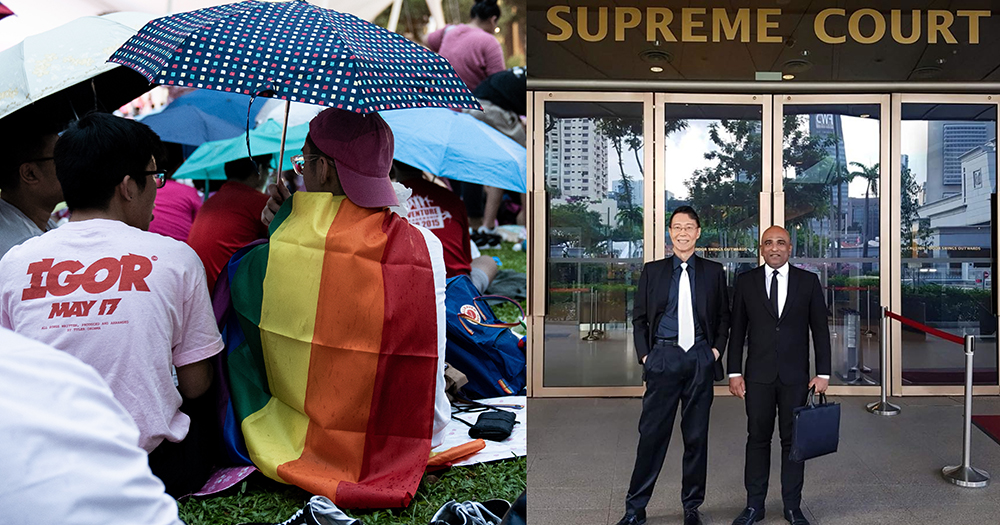Section 377A is an "absurd" and "arbitrary" law given that it is not enforced but the police are legally obligated to investigate allegations raised under it, as per Section 119 of the Penal Code.
This is because Section 119 makes it an offence for public servants not to take action against any offenders, or offenders who have the design to commit offences, such as those under Section 377A.
This was the argument laid out by lawyer M. Ravi, on behalf of retired GP and LGBT activist Roy Tan, on Nov. 18, in the third of three court challenges brought against Section 377A.
Police are also compelled under Section 424
In written submissions seen by Mothership, Ravi elaborated that apart from Section 119, the police are also legally compelled to investigate information of private consensual sex between adult males under Section 424 of the Criminal Procedure Code (CPC), where making a police report is mandatory.
He explained that this is due to Section 377A being covered as one of the offences under Chapter XVI of the penal code, which in turn is listed under Section 424.
As per Section 424 on the matter:
"Every person aware of the commission of or the intention of any other person to commit any arrestable offence punishable under Chapters...XVI of the Penal Code (Cap. 224) ...shall...immediately give information to the officer in charge of the nearest police station or to a police officer of the commission or intention."
Gay and bisexual men are also legally compelled to report their private acts
What's more, Section 424 essentially imposes a mandatory obligation on all gay and bisexual men to report their private acts to the police, thereby making it "incongruous" with the current absence of proactive enforcement for Section 377A, Ravi further noted.
He highlighted that should the men fail to do so, Section 176 of the Penal Code stipulates a punishment of up to one month's imprisonment or a fine of up to S$1,500, on the grounds of intentional omission.
As stated by Section 176:
"Whoever, being legally bound to give any notice or to furnish information on any subject to any public servant, as such, intentionally omits to give such notice or to furnish such information in the manner and at the time required by law, shall be punished with imprisonment for a term which may extend to one month, or with fine which may extend to $1,500, or with both."
Retaining Section 377A means gay and bisexual men are doubly criminalised
As such, Ravi added, retaining Section 377A means that gay and bisexual men are doubly criminalised, first by committing acts prohibited via Section 377A, and second, by not reporting these acts to the police.
This also means that Section 377A, when read in conjunction with Section 424 of the CPC and Section 176 of the Penal Code, violates Article 9(1) of Singapore's Constitution which guarantees a person of his life or personal liberty in accordance with the law.
This is because unpredictability and uncertainty about the law's application is, in itself, a serious interference with the liberty of gay and bisexual men.
Ravi subsequently concluded:
"It is accordingly impossible for a gay or bisexual man in Singapore to predict when he may be investigated for engaging in consensual sexual activity with another man given the various sections highlighted above under the Criminal Procedure Code and Penal Code."
Update: AGC responds to Ravi's arguments
In response, the Attorney-General's Chambers (AGC) issued a statement on Nov. 20 clarifying its position on prosecution under Section 377A.
As per the AGC:
"The AG has already stated that where the conduct in question was between two consenting adults in a private place, the Public Prosecutor’s position is that, absent other factors, prosecution under s 377A would not be in the public interest. It would naturally follow from this position that any prosecution under other provisions which would contradict the non-prosecution position of s 377A would likewise not be in the public interest."
Here's what the other two challenges against Section 377A said:
Left photo by Kane Raynard Goh, right photo Ching S. Sia
If you like what you read, follow us on Facebook, Instagram, Twitter and Telegram to get the latest updates.
